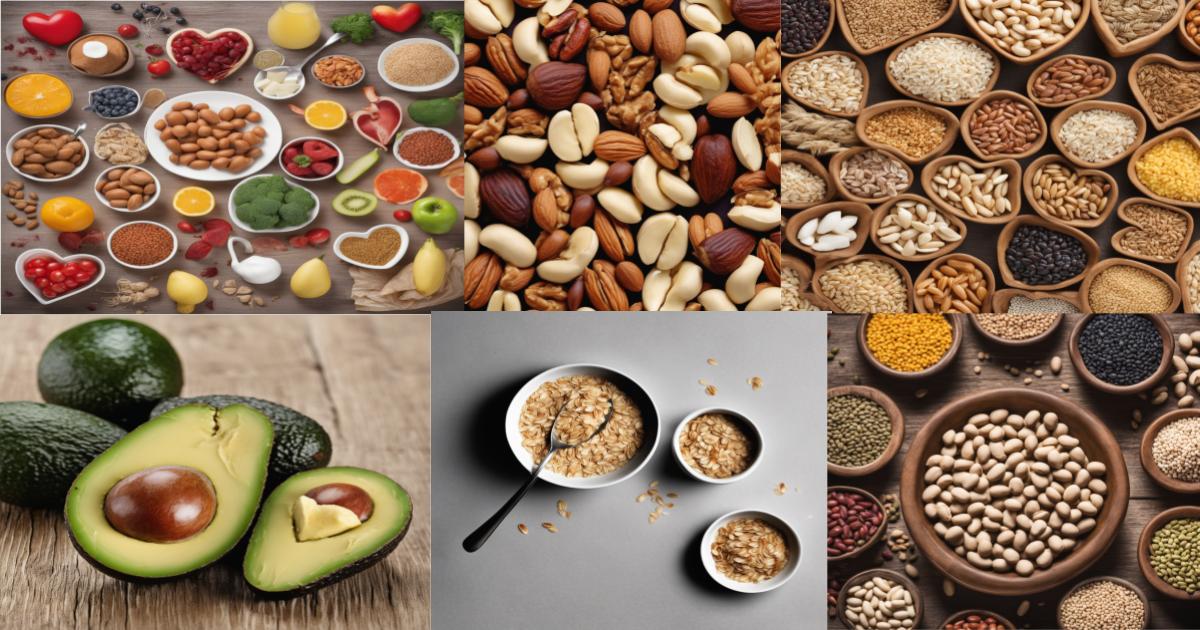The Power of Nutrition in Supporting Heart Health
Nutrition plays a critical role in supporting heart health. The foods we consume can either contribute to or mitigate the risk of heart disease. Here are some key points about the power of nutrition in supporting heart health:
- Healthy Fats: Consuming the right types of fats is essential. Replace saturated fats (found in red meat, full-fat dairy, and some processed foods) with healthier fats like monounsaturated and polyunsaturated fats (found in olive oil, avocados, nuts, and fatty fish). These healthier fats can help lower bad cholesterol levels and reduce the risk of heart disease.
- Omega-3 Fatty Acids: Found in fatty fish (like salmon, mackerel, and sardines), flaxseeds, chia seeds, and walnuts, omega-3 fatty acids have been shown to reduce inflammation, lower triglycerides, and improve overall heart health.
- Fiber-Rich Foods: Diets rich in fiber, especially soluble fiber, can help lower cholesterol levels. Oats, beans, lentils, fruits, and vegetables are excellent sources of fiber.
- Fruits and Vegetables: These foods are loaded with vitamins, minerals, antioxidants, and dietary fiber. They help lower blood pressure, reduce inflammation, and improve overall cardiovascular health.
- Whole Grains: Choose whole grains over refined grains. Whole grains like brown rice, quinoa, whole wheat, and oats provide more nutrients and dietary fiber, which are beneficial for heart health.
- Limit Sodium Intake: High sodium intake can contribute to high blood pressure, which is a risk factor for heart disease. Be mindful of your salt consumption and try to choose low-sodium options.
- Limit Added Sugars: High intake of added sugars has been linked to obesity, diabetes, and heart disease. Read labels to identify hidden sugars in processed foods and beverages.
- Moderate Alcohol Consumption: If you drink alcohol, do so in moderation. This generally means up to one drink per day for women and up to two drinks per day for men.
- Antioxidant-Rich Foods: Foods rich in antioxidants, such as berries, dark chocolate, and nuts, can help reduce oxidative stress and inflammation, both of which are linked to heart disease.
- Control Portion Sizes: Overeating, even healthy foods, can lead to weight gain and other risk factors for heart disease. Be mindful of portion sizes.
- Stay Hydrated: Drinking plenty of water is important for overall health, including heart health. Dehydration can strain the heart.
- Limit Trans Fats: Trans fats, often found in partially hydrogenated oils in processed and fried foods, are harmful for heart health. Many countries have taken steps to ban or reduce the use of trans fats in foods.
- Plant-Based Diets: Plant-based diets, such as vegetarian or vegan diets, can be heart-healthy if they are well-balanced and include a variety of nutrient-rich foods.
- DASH Diet: The Dietary Approaches to Stop Hypertension (DASH) diet is specifically designed to lower blood pressure and is rich in fruits, vegetables, whole grains, lean proteins, and low-fat dairy.
Remember that heart health is a result of a combination of factors, including nutrition, physical activity, genetics, and lifestyle choices. It’s always a good idea to consult with a healthcare professional or a registered dietitian before making significant changes to your diet, especially if you have existing health conditions.

Incorporating Heart-Healthy Choices into Your Diet
Berries: A Burst of Antioxidants for Cardiovascular Wellness, Berries, vibrant and delicious, offer a potent burst of antioxidants that promote cardiovascular wellness. Rich in compounds like anthocyanins and vitamin C, berries combat oxidative stress, reduce inflammation, and enhance blood vessel function. Regular consumption of strawberries, blueberries, and raspberries has been linked to lower blood pressure, improved cholesterol levels, and reduced risk of heart disease. Their natural sweetness and bounty of fiber further contribute to balanced blood sugar levels. Including a variety of berries in your diet supports a heart-healthy lifestyle, offering a tasty and nourishing way to safeguard your cardiovascular health.

Fatty Fish: Omega-3 Rich Goodness for a Strong Heart
Fatty fish, a potent source of omega-3 fatty acids, offers vital support for a robust heart. Omega-3s lower triglycerides, reduce inflammation, stabilize heart rhythms, and enhance arterial function. These benefits collectively promote cardiovascular health, reducing the risk of heart disease and stroke. Including fatty fish like salmon, mackerel, and sardines in your diet fosters optimal heart function, reinforcing overall well-being.

Leafy Greens: Nutrient-Dense Allies in Heart Protection
Leafy greens, such as spinach, kale, and Swiss chard, stand as potent allies in safeguarding heart health. Brimming with fiber, antioxidants, and essential vitamins like K and folate, they aid in lowering blood pressure, reducing cholesterol, and enhancing blood vessel function. The presence of nitrate compounds contributes to vasodilation, promoting healthy blood flow. Moreover, their low calorie content supports weight management, reducing heart strain. By incorporating these nutrient-dense greens into your diet, you can fortify your heart’s defenses and pave the way for a healthier cardiovascular system.
Whole Grains: Fiber-Packed Staples for Heart Maintenance
Whole grains, like oats, quinoa, and brown rice, are heart-healthy powerhouses. Rich in fiber, they help lower cholesterol, regulate blood pressure, and reduce the risk of heart disease. Their nutrients, like magnesium and potassium, support heart function. Fiber aids digestion and weight management, further benefiting the heart. Opt for whole grains to nourish your cardiovascular system and promote overall health.
Nuts and Seeds: Heart-Friendly Fats for Optimal Function
Nuts and seeds offer heart-friendly fats that optimize function. Rich in unsaturated fats, they promote healthy cholesterol levels and reduce inflammation. Packed with nutrients like omega-3 fatty acids, fiber, and antioxidants, they support cardiovascular health. Incorporating nuts and seeds into your diet can enhance blood vessel elasticity and lower the risk of heart disease. Almonds, walnuts, flaxseeds, and chia seeds are excellent choices. Remember, moderation is key, as they are energy-dense. Prioritize these wholesome options for a nourishing way to care for your heart.
Avocado: Creamy Delight Promoting Heart Wellbeing
Avocado, nature’s creamy delight, is a nutrient-rich powerhouse that promotes heart wellbeing. Packed with heart-healthy monounsaturated fats, it aids in lowering bad cholesterol levels while boosting good cholesterol. Its abundant potassium content helps regulate blood pressure, reducing cardiovascular risks. Fiber-rich avocados enhance digestion and weight management, further benefiting the heart. Vitamins like E, C, and K, along with folate, contribute to overall cardiovascular health. Additionally, avocado’s antioxidants combat inflammation, supporting optimal heart function. Incorporating this luscious fruit into your diet not only delights the taste buds but also nourishes the heart, making it an essential ingredient for a vibrant, robust life.
Oats: Cholesterol-Controlling Breakfast Essential
Oats, a cholesterol-controlling breakfast essential, are a nutritional powerhouse. Packed with soluble fiber, they help reduce LDL cholesterol levels, promoting heart health. Beta-glucans in oats form a gel-like substance in the digestive tract, trapping cholesterol and aiding its elimination. Rich in antioxidants, oats combat oxidative stress and inflammation. Their low glycemic index provides sustained energy, ideal for weight management. Versatile and quick to prepare, oats can be enjoyed as oatmeal, granola, or added to smoothies. By incorporating oats into your morning routine, you’re making a heart-smart choice that supports overall well-being.
Legumes: Plant-Based Protein for Heart-Centric Diets
Legumes offer an excellent plant-based protein source for heart-centric diets. Rich in fiber, vitamins, and minerals, they promote heart health by lowering cholesterol levels, managing blood pressure, and reducing inflammation. Incorporating beans, lentils, chickpeas, and peas into meals enhances cardiovascular well-being while providing essential nutrients without saturated fats found in animal protein. Their versatility allows for creative culinary exploration, catering to various dietary preferences. By embracing legumes, individuals can cultivate a heart-healthy lifestyle that supports both their nutritional needs and long-term cardiovascular wellness.
Dark Chocolate: Savoring Heart Benefits in Moderation
Dark chocolate offers potential heart benefits due to its high cocoa content. Flavonoids, specifically flavanols, present in cocoa have been linked to improved heart health by enhancing blood flow, reducing blood pressure, and boosting overall vascular function. These effects may contribute to a lower risk of heart disease. However, moderation is crucial, as chocolate also contains sugar and calories that can offset its benefits. To savor the heart benefits without excess, opt for high-quality dark chocolate with at least 70% cocoa content. Enjoying a small amount as part of a balanced diet is key to reaping its potential advantages.

Olive Oil: Liquid Gold for Heart-Healthy Cooking
Olive oil, often dubbed “liquid gold,” is a heart-healthy culinary gem. Its monounsaturated fats lower bad cholesterol, reducing cardiovascular risks. Rich in antioxidants and anti-inflammatory properties, it supports overall heart health. A cornerstone of Mediterranean cuisine, it enhances flavors in salads, sautés, and dressings. However, moderation is key due to its calorie density. Opt for extra virgin varieties for maximal benefits. In the realm of heart-healthy cooking, olive oil shines as an essential ingredient, embodying both exquisite taste and positive well-being.
Crafting Your Heart-Healthy Meal Plan: Putting It All Together
Design a heart-healthy meal plan by prioritizing whole foods like fruits, vegetables, whole grains, lean proteins, and healthy fats. Opt for lean meats, fish, beans, and nuts. Limit salt, sugar, and processed foods. Start your day with a fiber-rich breakfast, incorporate colorful salads and cooked veggies into lunch and dinner, and snack on fruits and nuts. Choose whole grains like quinoa and brown rice. Include fatty fish for omega-3s twice a week. Use olive oil for cooking. Stay hydrated with water. Control portions to maintain a healthy weight. Regular exercise and stress management are vital for a holistic approach to heart health.
Lifestyle Tips for Comprehensive Heart Care
- Balanced Diet: Prioritize fruits, vegetables, whole grains, lean proteins, and healthy fats. Limit salt, sugar, and processed foods.
- Regular Exercise: Aim for at least 150 minutes of moderate-intensity aerobic activity or 75 minutes of vigorous activity weekly, plus muscle-strengthening exercises.
- Weight Management: Maintain a healthy weight through a combination of a nutritious diet and regular physical activity.
- No Smoking: Quit smoking to drastically reduce your heart disease risk.
- Stress Management: Practice relaxation techniques like meditation, yoga, or deep breathing to alleviate stress.
- Quality Sleep: Aim for 7-9 hours of sleep per night to support heart health.
- Limit Alcohol: If you choose to drink, do so in moderation (1 drink per day for women, 2 for men).
- Regular Check-ups: Monitor blood pressure, cholesterol, and blood sugar levels. Follow medical advice.
- Stay Hydrated: Drink plenty of water to promote overall health.
- Social Connections: Maintain healthy relationships for emotional well-being.
- Mindful Eating: Pay attention to portion sizes and eat slowly to prevent overeating.
- Limit Caffeine: Moderate your caffeine intake for heart health and better sleep.
- Avoid Trans Fats: Stay away from foods containing trans fats to reduce bad cholesterol levels.
- Stay Informed: Keep learning about heart health and stay updated on medical recommendations.
- Stay Active: Incorporate movement into daily routines, like taking the stairs or walking during breaks.
- Hygiene Matters: Maintain oral hygiene as gum disease is linked to heart issues.
- Manage Conditions: Control conditions like diabetes and hypertension as they affect heart health.
- Laugh Often: Cultivate a sense of humor for its positive impact on heart health.
- Mediterranean Diet: Consider this heart-friendly eating pattern rich in fruits, vegetables, whole grains, and olive oil.
- Positive Outlook: Foster optimism and positivity for overall well-being.
Remember, comprehensive heart care involves a holistic approach that addresses physical, mental, and emotional well-being. Always consult a healthcare professional before making significant lifestyle changes.
Consulting a Professional: Tailoring Diet to Individual Heart Needs
Seeking guidance from a healthcare professional is crucial for tailoring a personalized heart-healthy diet. Factors like medical history, cholesterol levels, blood pressure, and dietary preferences influence recommendations. Emphasize whole foods, lean proteins, and good fats. Customized adjustments might include reducing sodium for hypertension, increasing fiber for cholesterol management, or moderating carbohydrates for diabetes. Regular monitoring and adjustments, guided by a healthcare provider, ensure an effective plan aligned with individual heart needs.
Conclusion: Empowering Your Heart through Smart Dietary Choices
In the journey to a healthier heart, your dietary choices wield immense power. Opt for nutrient-rich foods like vibrant fruits, crisp vegetables, whole grains, and lean proteins. Embrace heart-healthy fats, limit sodium, and avoid sugary traps. Portion control is pivotal. Hydration and mindful eating amplify benefits. Craft a sustainable eating plan, and consider the Mediterranean diet’s wisdom. Remember, these choices are steps towards vitality, reducing risks of heart disease. Fuel your body with respect, for every bite shapes your heart’s future. Consult professionals, stay informed, and relish the transformation – nurturing your heart is a lifelong gift to yourself.






Pingback: A Complete Guide to Managing Diabetes - HealthyReel
Pingback: Crucial Vitamins for Cancer Prevention - HealthyReel
Pingback: 7 Common symptoms of diabetes - HealthyReel